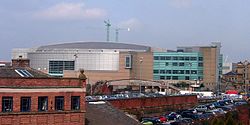Top Qs
Timeline
Chat
Perspective
2010 Premier League Darts
Darts competition From Wikipedia, the free encyclopedia
Remove ads
The 2010 Whyte & Mackay Premier League was a darts tournament organised by the Professional Darts Corporation; the sixth such running of the tournament.
The tournament began at The O2 Arena in London on 11 February, and finished at the Wembley Arena on 24 May.
Phil Taylor won in the final 10–8 against defending champion James Wade, where he also became the first player to hit two nine-dart finishes in a single match.
Remove ads
Qualification
The top six players from the PDC Order of Merit following the 2010 PDC World Darts Championship were confirmed on 5 January. Simon Whitlock and Adrian Lewis were named as the two Sky Sports wild card selections; Whitlock being announced on 4 January[1] and Lewis on 13 January.[2]
WC = Wild Card
Remove ads
Venues
Fifteen venues were used for the 2010 Premier League, with the only change from 2009 being Bournemouth replacing Edinburgh after a one-year absence.
Remove ads
Prize money
The prize money increased again with the total prize fund rising to £410,000, as a third place play-off was introduced, earning the winner of that an extra £10,000 to their £40,000 for reaching the play-offs.[3][4]
Results
Summarize
Perspective
League stage
Play-offs – 24 May
![]() Wembley Arena, London
Wembley Arena, London
- The play-offs were originally scheduled for 23 May, but due to a power cut in the area surrounding the Wembley Arena, they were postponed until 24 May.[21]
Nine-dart finishes
The finals night saw the second and third nine-dart finishes of the 2010 Premier League Darts, and the third and fourth in Premier League Darts overall, in the final between Phil Taylor and James Wade.
Trailing 1–0 after losing the throw in the first leg, Taylor responded with a 174 (T20, 2 T19s), 180 (3 T20s), and 147 (T20, T17, D18) to take the second leg against throw. This was Taylor's first nine-dart finish in the Premier League, having only been achieved previously by Raymond van Barneveld. This was also the first nine-dart finish in a televised final.
In the 15th leg he hit the second nine-dart finish of the night with two 180s and checked out on 141 (T20, T19, D12). This was the first time that the same player achieved two nine-dart finishes in one match. After the second nine-darter, Taylor made it 17 consecutive perfect darts, needing only T17 D18 for a third nine-darter and second on the trot, he missed the T17 by an inch, but still went on to win that leg in 10 darts, after then hitting T18, then returning to hit the D8 with his first dart.
Remove ads
Table and streaks
Table
Top four qualified for Play-offs after Week 14.
NB: LWAT = Legs Won Against Throw. Players separated by +/- leg difference if tied.
Streaks
NB: W = Won D = Drawn L = Lost
Remove ads
Player statistics
Summarize
Perspective
The following statistics are for the league stage only. Playoffs are not included.
Phil Taylor
- Longest unbeaten run: 14
- Most consecutive wins: 4
- Most consecutive draws: 1
- Most consecutive losses: 0
- Longest without a win: 1
- Biggest victory: 8-1 (v. Adrian Lewis)
- Biggest defeat: Player Undefeated
Simon Whitlock
- Longest unbeaten run: 3
- Most consecutive wins: 2
- Most consecutive draws: 1
- Most consecutive losses: 1
- Longest without a win: 2
- Biggest victory: 8-2 (v. Mervyn King)
- Biggest defeat: 3-8 (v. Phil Taylor)
James Wade
- Longest unbeaten run: 4
- Most consecutive wins: 2
- Most consecutive draws: 2
- Most consecutive losses: 3
- Longest without a win: 5
- Biggest victory: 8-3 (v. Raymond van Barneveld)
- Biggest defeat: 2-8 (v. Phil Taylor)
Mervyn King
- Longest unbeaten run: 3
- Most consecutive wins: 2
- Most consecutive draws: 2
- Most consecutive losses: 3
- Longest without a win: 3
- Biggest victory: 8-2 (v. Terry Jenkins)
- Biggest defeat: 1-8 (v. Phil Taylor)
Ronnie Baxter
- Longest unbeaten run: 3
- Most consecutive wins: 2
- Most consecutive draws: 2
- Most consecutive losses: 1
- Longest without a win: 6
- Biggest victory: 8-4 (v. Raymond van Barneveld)
- Biggest defeat: 2-8 (v. Raymond van Barneveld)
Raymond van Barneveld
- Longest unbeaten run: 2
- Most consecutive wins: 2
- Most consecutive draws: 1
- Most consecutive losses: 5
- Longest without a win: 6
- Biggest victory: 8-2 (v. Ronnie Baxter)
- Biggest defeat: 2-8 (v. Phil Taylor (twice))
Adrian Lewis
- Longest unbeaten run: 2
- Most consecutive wins: 2
- Most consecutive draws: 2
- Most consecutive losses:2
- Longest without a win: 5
- Biggest victory: 8-3 (v. Raymond van Barneveld)
- Biggest defeat: 1-8 (v. Phil Taylor)
Terry Jenkins
- Longest unbeaten run: 3
- Most consecutive wins: 2
- Most consecutive draws: 2
- Most consecutive losses: 6
- Longest without a win: 6
- Biggest victory: 8-4 (v. Ronnie Baxter)
- Biggest defeat: 2-8 (v. Mervyn King)
Remove ads
References
External links
Wikiwand - on
Seamless Wikipedia browsing. On steroids.
Remove ads















